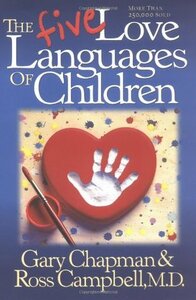You need to sign in or sign up before continuing.
Take a photo of a barcode or cover
I read the original 5 Love Languages book over 10 years ago, before I got married. The principals are the same or similar for kids, but kids ask for love or act out in different ways. Listening to this on audio, I realized I was missing some of my daughter’s cues of what she was really needing. It helped me be more aware of what’s really going on and careful in how I respond to her. Showing love in all 5 major ways, but especially in her main love language is more important than ever with so much change and uncertainty with this coronavirus.
Such a great way to better understand your kids and learn how to work with them.
If you haven't already, please read this book.
This book changed and improved my life and my relationship with my sweet children. It helped me to understand, not only my children, but myself as well. I am more patient and less stressed. My children are happier, more content, secure, and self-confident because their love tanks are full. Being a parent is difficult and tiring and this book provides, what I consider, inspired insight on how to better love and understand our children the way children should be loved and understood. I wish every parent would read this book. I truly feel that more children would be treated with increased kindness, patience, and love. For me, this is an invaluable book.
This book changed and improved my life and my relationship with my sweet children. It helped me to understand, not only my children, but myself as well. I am more patient and less stressed. My children are happier, more content, secure, and self-confident because their love tanks are full. Being a parent is difficult and tiring and this book provides, what I consider, inspired insight on how to better love and understand our children the way children should be loved and understood. I wish every parent would read this book. I truly feel that more children would be treated with increased kindness, patience, and love. For me, this is an invaluable book.
Perfect read for a new mom. I liked the examples shared and the idea that a love tank needs to be filled daily. A full tank sets kids up for success. Finding the right language is important, but kids benefit from all languages. The reminder about controlling your anger and not using their language negatively was greatly needed in my parenting. Kids really should come with better instructions. ;)
Physical touch
Words of affirmation
Gifts
Acts of service
Quality time
Physical touch
Words of affirmation
Gifts
Acts of service
Quality time
I read the five love languages book about 9 months before I read this one. I thought this one would provide additional insights but I feel like I was able to apply the first book to my children fine and this one there was a lot of repeat information. It wasn't bad at all, but if I was to recommend one book it would be the original five love languages book. That being said, I didn't enjoy the chapter on loving an angry child and teaching them how to work through their anger using love languages.
This was recommended to me by a friend, and I'm really glad I read (listened) to it. I generally find parenting books to be pretty patronizing, but this one wasn't too guilt-inducing. I was familiar with the original love languages book, and I wondered if it would just be the same book under a different title, but I think it was really appropriately adapted to what children need. For instance, the author says that it doesn't matter what your child's primary love language is -- ALL children need loving touch.
Specifics that I liked:
~I appreciated the lists at the end of each section, giving examples of simple ways to express love. There were some great ideas that were very easy for me to start using in my relationships with my sons.
~I loved the chapter on physical touch, because it seemed in line with what I learned in my child psychology class in college -- specifically, that teenagers need loving touch from their parents even when they start feeling awkward about their physical development.
~I felt like the book was well balanced about justice and mercy. Parents should help their children in some things, but their child needs to be taught limits and responsibility, too.
Other things:
~Just FYI: this book incorporates Christianity throughout the scenarios. While that is my religion, I'm not always looking for that in ALL books I read. This didn't seem too heavy handed to me, but it's something to be aware of when picking up the book.
~Something I did NOT like was just a brief couple of sentences in the epilogue, where it talked about abusive parents - the phrase "sexual abuse" is specifically used -- repenting and rebuilding their relationships with their children. I guess that's between the parent and the adult child (and hopefully a trained therapist or other advocate), but I feel like that is a "you need to go to jail" situation. I didn't get any other overly-forgiving vibes throughout the book, just that one part in the epilogue (thankfully).
I'd recommend reading this to refocus on good ways to connect with your child and show them you love them.
Specifics that I liked:
~I appreciated the lists at the end of each section, giving examples of simple ways to express love. There were some great ideas that were very easy for me to start using in my relationships with my sons.
~I loved the chapter on physical touch, because it seemed in line with what I learned in my child psychology class in college -- specifically, that teenagers need loving touch from their parents even when they start feeling awkward about their physical development.
~I felt like the book was well balanced about justice and mercy. Parents should help their children in some things, but their child needs to be taught limits and responsibility, too.
Other things:
~Just FYI: this book incorporates Christianity throughout the scenarios. While that is my religion, I'm not always looking for that in ALL books I read. This didn't seem too heavy handed to me, but it's something to be aware of when picking up the book.
~Something I did NOT like was just a brief couple of sentences in the epilogue, where it talked about abusive parents - the phrase "sexual abuse" is specifically used -- repenting and rebuilding their relationships with their children. I guess that's between the parent and the adult child (and hopefully a trained therapist or other advocate), but I feel like that is a "you need to go to jail" situation. I didn't get any other overly-forgiving vibes throughout the book, just that one part in the epilogue (thankfully).
I'd recommend reading this to refocus on good ways to connect with your child and show them you love them.
Truly valuable time spent with this book. I didn’t necessarily agree with it all, and some of it was very one-dimensional, but that’s a big part of reading any parenting book - you have to be ready to read about things you may not like or agree with, and it doesn’t mean it’s wrong. For me, I spent that time thinking about what my kids need from their dad, and at times I thought about what I need and needed as a child. It’s interesting to me that I can re-parent myself through parenting my own kids. So, in the end, everyone grows.
This was a joint read, so we could read and discuss our parenting tactics, but it became much more than that. We'd worked through [b:The Five Love Languages|952|The Five Love Languages of Children|Gary Chapman|https://d.gr-assets.com/books/1438759392s/952.jpg|5166] before and I remember being blown away by that, not expecting the same thing here - and for a very different reason.
Our experimental test subject (first child) is still a toddler, under the key age for this book; the specific tactics aren't really applicable for under 4s, and you probably want to implement them before the teenage years begin (for everyone's sanity), so instead of plottingevil loving parental strategy we found ourselves mulling over our own childhoods and seeing them in an entirely new light. You could almost use this as a pre-counseling book, if needed.
Although nominally a Christian book you won't find it out of place anywhere - this is a parenting book, first and foremost. Anything else is by-the-by. I dinged a star because it was too repetitive in some places, but then I suspect it was also designed to allow people to just read one chapter here or there and still make sense of it.
Highly recommended to anyone who has children or plans to.
Our experimental test subject (first child) is still a toddler, under the key age for this book; the specific tactics aren't really applicable for under 4s, and you probably want to implement them before the teenage years begin (for everyone's sanity), so instead of plotting
Although nominally a Christian book you won't find it out of place anywhere - this is a parenting book, first and foremost. Anything else is by-the-by. I dinged a star because it was too repetitive in some places, but then I suspect it was also designed to allow people to just read one chapter here or there and still make sense of it.
Highly recommended to anyone who has children or plans to.
Good book. I liked the Anatomy of Peace much more, but this one makes some good points too.
This is written kind of like a text book: you don't really need to read the whole book in order; it's totally fine to read just the bits you need and use it as a reference.
One of the things that stood out to me in this is how important it is to make sure your child feels your love. If they don't feel your love, than any type of correction or discipline will likely seem arbitrary or controlling. If they do feel loved, they will more easily accept loving correction.
Along those lines, it's very important to love unconditionally, not just when the child makes us happy.
This is written kind of like a text book: you don't really need to read the whole book in order; it's totally fine to read just the bits you need and use it as a reference.
One of the things that stood out to me in this is how important it is to make sure your child feels your love. If they don't feel your love, than any type of correction or discipline will likely seem arbitrary or controlling. If they do feel loved, they will more easily accept loving correction.
Along those lines, it's very important to love unconditionally, not just when the child makes us happy.
informative
slow-paced



